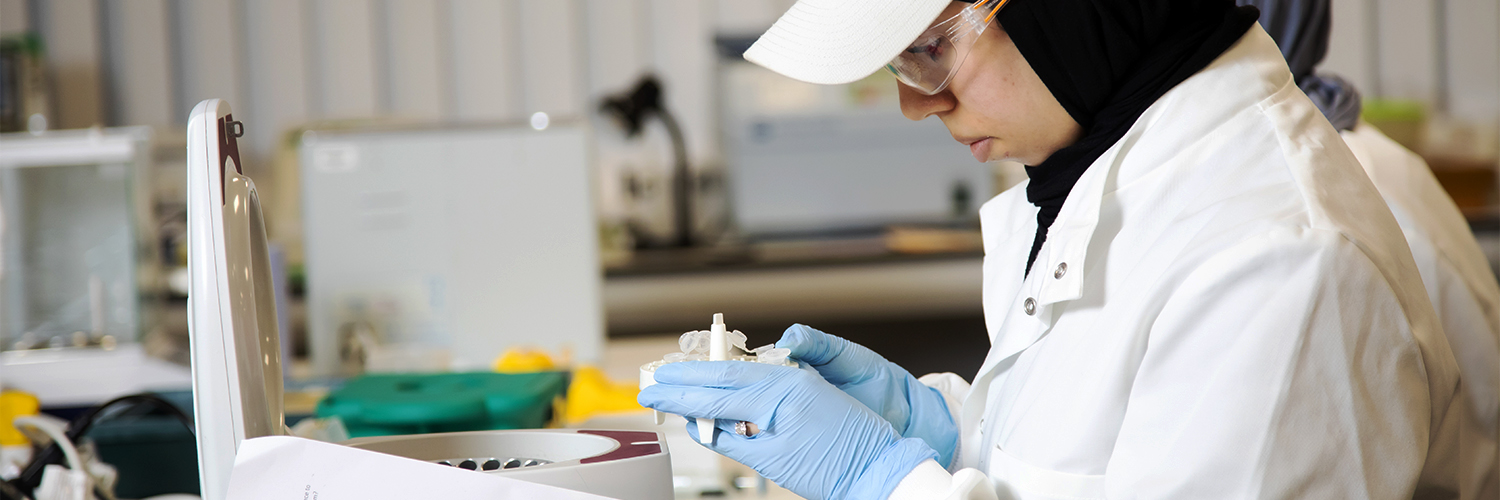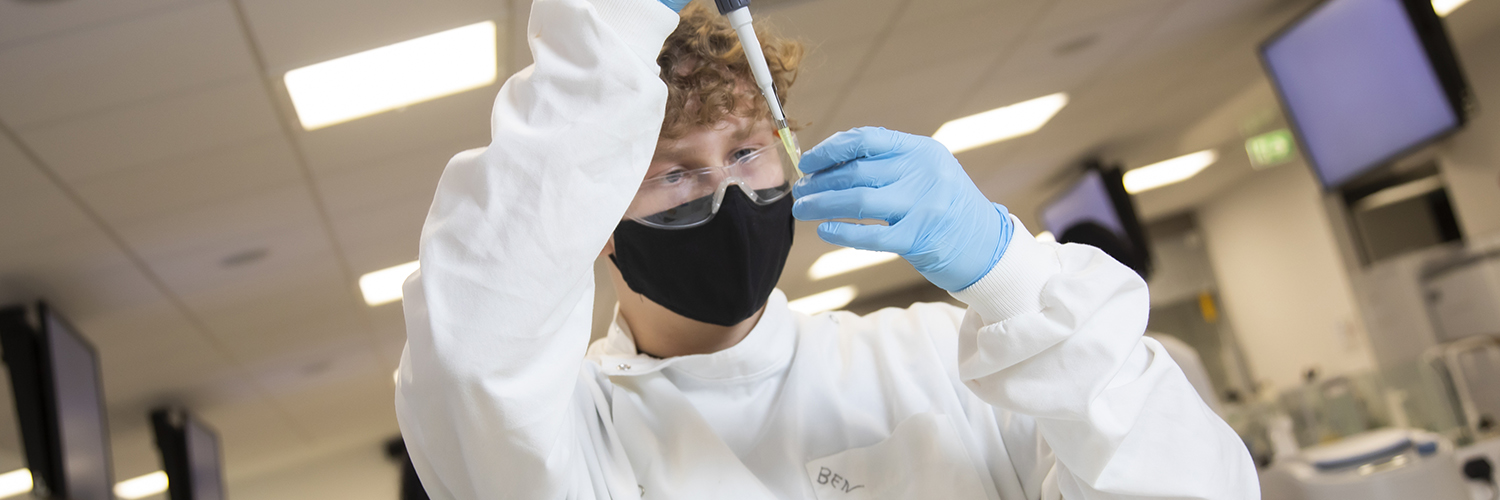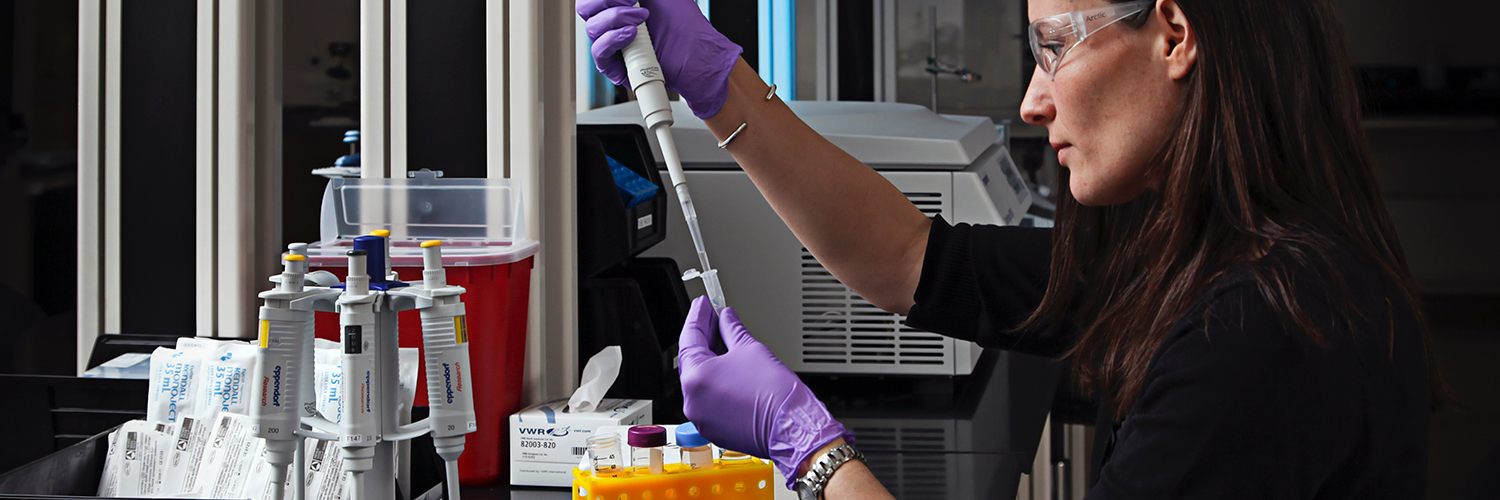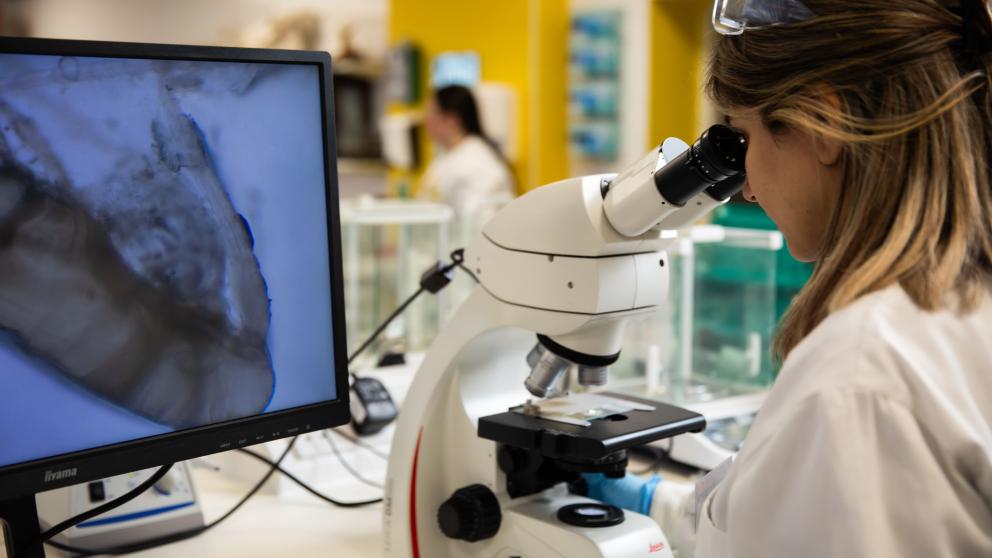
Human Biology and Infectious Diseases with Foundation Year
Full-time
Part-time
With placement
Four year
Eight year
Five year
September 2026
In a nutshell
Prepare for our BSc (Hons) Human Biology and Infectious Diseases (HBID) degree, our foundation year provides the basic, but essential understanding of biological principles that underpin the field. It is ideal if you have an interest in human biology and infectious diseases or a desire to enter a related career but do not currently have the necessary scientific background.
We aim to give you a solid foundation on which to build highly specialised and advanced expertise by providing the knowledge, practical and analytical skills required to confidently and effectively progress to study HBID at degree level. If you successfully complete and pass the foundation year, you will automatically progress on to the full BSc (Hons) Human Biology and Infectious Diseases degree course. Those who study our Royal Society of Biology accredited HBID degree seek to understand how the human body functions normally in health and abnormally in disease.
Underpinned by our cutting-edge research, HBID focuses on the detailed understanding of human anatomy and physiology, pathological processes and the biology, transmission and epidemiology of infectious disease. A major difference between HBID and Biomedical Science is rather than providing clinical context, we place more emphasis on the mechanistic knowledge required to understand how diseases spread then interact with the human body; essential for the development of new ways to treat and eradicate disease.
Start your study journey
Register for our next Open Day to learn more about studying human biology and infectious diseases, explore our facilities and meet the course team
You will:
- Gain a broad, basic knowledge of biological principles to prepare you for more advanced study
- Develop a solid foundation on which to build highly specialised and advanced expertise by providing the knowledge, practical and analytical skills
options available
Course accreditations
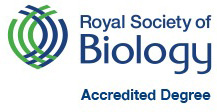
This is for you if...
You want an excellent route into science for those from a non-scientific background
You are returning to education or seeking to develop your career in a new direction
You didn't meet the entry requirements for the BSc (Hons) Human Biology and Infectious Diseases
All about the course
Foundation year
The introductory foundation year is designed to increase your knowledge and understanding of human and natural sciences, taking into account the integrated and multidisciplinary nature of human biology and infectious diseases.
Following a carefully-designed suite of modules, you will strengthen your knowledge of biological and chemical principles, and feel confident in a live laboratory environment. Alongside building knowledge of biology, you will also develop communication and study skills so you can succeed at a higher level.
If you successfully complete and pass your Foundation Year but you're still not sure this is the subject for you, we have an extensive suite of Human and Natural Sciences (HANS) subjects you can still progress to:
- Biological Science
- Biomedical Science
- Marine Biology
- Geography
- Environmental Management
- Pharmaceutical Science
- Biochemistry
- Zoology
- Wildlife Conservation
- Wildlife Conservation with Zoo Biology
BSc degree
Course delivery
Now is an exciting time to study human biology and the impact of infectious diseases. For three years of study - or four, if you choose to include a placement, you will explore fascinating and relevant subjects, including parasitology, pathophysiology and molecular genetics. You will gain insight into disease diagnosis and treatment all while refining your practical laboratory and research skills.
Learn more about the modules you will study in the section below.
Learning experience
This course has a hands-on focus, enabling you to develop the practical skills you need for a career in laboratory research in a wide range of industry sectors. You will be taught by expert academics and technicians, who undertake cutting-edge research in our Biomedical Research Centre.
In your final year you will specialise your skills by choosing optional modules in areas such as antimicrobial resistance, pathophysiology, clinical immunology and veterinary and zoonotic infectious diseases. You will also develop your research design, problem solving and critical analysis skills by completing a final year project on a topic of your choice.
Read about Alia's experience studying Human Biology and Infectious Diseases
Industry placement
On this course, you will have the option to take an industry placement year between years two and three. Although you will be responsible for securing your placement, a tutor will support you, monitor your progress and assess your final placement report. In our experience, placement students achieve better final degree results and employment prospects.
Building on our industry-focused approach, we have developed longstanding connections with regional health and scientific research organisations. Recent Human Biology and Infectious Diseases students have completed placements at the Wolfson Imaging Centre in Manchester, the Clinical Epidemiology unit at Manchester and at TSC Ltd in Heywood.
Biological Principles
Explore the characteristics of plant and animal cells which are the building blocks of all life forms; their interactions with micro and macro environments, and learn about the diversity of animal and plant life in a range of ecosystems.
Chemical Principles
This module will help you develop an understanding of the fundamentals of the periodic table, classification within chemistry, reaction processes and quantities, and the fundamentals of organic chemistry through lectures, laboratory workshops and independent study via an interactive learning platform.
Scientific Methods
This module will help you develop practical skills in the fields of biological, chemical and environmental science. It includes the use of glassware and instrumentation, developing data recording and analysis skills, and foundational laboratory-training. It also aims to train all students on how to write-up experimental work via an interactive learning platform, which includes pre- and post- laboratory training exercises.
Professional Communications
This module will provide students with a structured and supportive environment in which to develop their academic practice and professionalism. This will be achieved through a series of lectures and tutor-led seminars that will equip students with the skills required for successful study in Higher Education.
Data Handling
Develop skills for the application of statistical and mathematical methods and practise using Information Technology for effective the presentation and communication of data and ideas.
Science for Health
Evaluate a range of environmental and scientific factors that interact to influence health – e.g. pollution, nutrition, drug development and consider examples of environmental interventions and clinical trials.
Molecules to Microbes
This module focuses on the basic principles involved in the build-up of molecules from atoms: the formation, properties and importance of bio-organic molecules, the diverse nature of micro-organisms and their structure, function and importance.
Genetics
Genetics has become a central topic not only in biological science, but also for topics such as data science, art and culture. Genetics is revolutionising all spheres of life at an unprecedented speed. It is central to all areas of biology, from cellular development and reproduction to conservation and biodiversity. In this core module, we will provide you with the framework of this diverse area, covering areas from DNA fingerprinting and DNA/RNA editing, to ethics and conservation biology. We will expose you to the latest research in the area of molecular genetics and provide the foundation for your future.
Human Anatomy
The module aims to introduce aspects of Human Anatomy/Embryology and enable the appreciation of structure-function relationships at the level of the cell, tissue, organ, system and organism. The lectures in the first trimester will introduce Gross Anatomy and Embryology using a system-based approach and the second trimester will detail the Histology at cellular and tissue level. The collective systems led approach will provide a good understanding of the macroscopic and microscopic structure-function aspects of the human body.
Biological Skills
This module will help you develop practical laboratory skills employed in biological laboratory practice and relevant to cell, organismal, micro and molecular biology, which will form a basis for competence in biological and biochemical experimental work.
Study Skills
In this module you will learn by observation, investigation, comparison and engagement and will develop practical learning and presentation methods which can be applied generically during year one and beyond. You will also gain an appreciation of Personal Development Planning and effective data handling, calculation and numerical skills.
Cell Biology
This module provides a broad cell biology knowledge base, building a solid foundation of key scientific content relevant to subsequent modules within several bioscience degrees.
Molecular Genetics
Molecular Genetics will enable students to gain practical skills in molecular biology and bioinformatics, through linked laboratory and computer sessions. The lecture programme is delivered by three academics, each an expert in their specific area of molecular genetics. Topics covered include, current molecular biology and bioinformatics techniques, the control of bacterial and eukaryotic gene expression, the effect of mutations on gene expression, population genetics and the application of molecular genetics to conservation.
Introduction to Parasitology and Infectious Diseases
This module aims to provide you with a comprehensive lecture programme and directed reading, enabling you to gain knowledge and understanding of: the range of infectious diseases that impact on humans; the basic biology and life cycles of protozoa and helminths of medical importance; vectors that transmit infectious agents and the internal and external factors that affect transmission of infectious diseases.
Biological Research Skills
This module is designed to help you develop an ability to understand the basics of scientific research in the following areas in order to prepare you for future research based activity:
- critical evaluation of research-based literature
- understanding experimental techniques and design
- data interpretation, analysis and presentation
- dissertation writing and presentation
Microbial Communities and Interactions
This module will help you to build your knowledge and understanding of fundamental concepts in microbiology. You will learn about the phenomenal diversity of microbial metabolism and genetics and how microorganisms have adapted in communities to survive and thrive in the most extraordinary habitats. You will investigate key examples of microbial interactions with their hosts and with each-other and how this can lead to disease or beneficial relationships. Our field trip provides a first-hand experience of how microorganisms are applied to benefit human populations. You will also refine your skills in practical microbiology, experimental design, data presentation and critical awareness of scientific research.
Pathophysiology
In this module you will learn the inter-related nature of human disease and major diagnostic approaches. Assessment is via a series of case studies to develop awareness of disease processes on a cellular level and their manifestation into localised and systemic clinical symptoms. Students gain insight into clinical diagnostic techniques and their underpinning principles.
Human Physiology
Investigate the function of major organ systems and how they regulate homeostasis. Using cutting-edge lab equipment, you will develop practical skills to analyse physiological adaptations as true physiologists do in the world sport and exercise science.
Human Genetics
The role of genetics and genomics has now become mainstream and is at the forefront of healthcare and disease management strategies. In your final year, the human genetics module will expose you to the recent developments in the field, together with the foundations of human genetics. The rapid advancement of genomics has also enabled data-based discovery of genetic information. In view of that, you will have a dedicated part of the content focused on data science and analysis strategies including the R statistical package.
Biology of Parasites
This module looks at the importance of human and animal parasites, in relation to medical, veterinary or wildlife aspects, life-cycle biology, host response and the principles of parasite epidemiology and transmission. You will also study strategies for parasite detection, diagnosis and control. The module includes a unique field course to enable you to see parasites living in their natural environment.
Choose one of the following optional modules:
Advances In Pathophysiology
This highly interactive optional final year module allows students to explore methods used in the diagnosis, monitoring and treatment of cardiovascular and respiratory (thoracic) diseases. Assessment of the module uses real case studies to enable students to develop both their analytical and critical narrative skills. Students will learn mechanisms of disease, how these relate to clinical outcomes, how patient care plans are developed, and the future approaches of thoracic medicine. Special features of the module include full CPET testing in the Health School human performance lab and the opportunity to visit to the North West Lung Centre to engage with clinical pulmonary testing.
Clinical Immunology
Immunology is the study of the immune system. It is now a well-developed basic science, which is useful for the diagnosis and management of a great number and variety of human diseases. This module is designed to give an in-depth view of the basic components of the immune system and how these influence human diseases. Research-based discussion will be part of this module in understanding immune mechanisms in defense against human diseases and how these mechanisms can be dysregulated. Understanding the immune system leads to better clinical diagnostic and monitoring possibilities. Towards the end of the module you will also be given an overview of how the immune system can protect the body from developing cancers.
Plus one of the following:
Antimicrobial Resistance: Threats and Solutions
Antimicrobial resistance (AMR) is now widely recognised as one of the greatest threats to global health. This module focuses on the reasons underlying the emergence of AMR and investigates diverse often innovative solutions to the crisis.
Veterinary and Zoonotic Infectious Diseases
This module looks at the maintenance and transmission of infectious diseases of veterinary or zoonotic interest. Particular interest is focused on the role of wildlife species in the ecology and epidemiology of infectious diseases. The role of arthropod-vectors in transmitting infections, and how this influences the ecology of such infections, is also studied.
Choose one of the following final year project options
Final Year Project with Science Communication and Professional Skills (HANS)
This dissertation module allows you to develop independent research skills, including data analysis, while conducting research on a topic in an area relevant to your programme of study. You will learn about science communication and the variety of methods in which science can be disseminated and communicated, and then put these methods into practice. You will also develop your professional skills, with a focus on employability.
Final Year Project and Professional Skills
This dissertation module allows you to develop independent research skills, including both data collection/generation (for example, via lab-based research or fieldwork) and analysis, while conducting research on a topic in an area relevant to your programme of study. You will also develop your professional skills, with a focus on employability.
We take a flexible approach to our course delivery that promotes diversity and inclusivity and provides a blended learning experience, which will vary to meet specific programme requirements. This learning time includes formal lectures and interactive activities such as seminars, tutorials, practical sessions, laboratory and studio learning. Smaller classes may be used to support collaborative activities such as project and group work and presentations. A range of different assessments and feedback is offered to meet the needs of both our diverse student body and specific subject needs.
Our undergraduate courses are normally made up of 20 credit modules which are equal to 200 hours of learning time. A three-year degree qualification typically comprises a total of 360 credits (120 credits per year).
Please note that exact modules and content offered may vary in order to keep content current and, for courses that offer optional modules, may depend on the number of students selecting particular options. When accepting your offer of a place to study on a programme with optional modules, you should be aware that optional modules may not all run each year. Your tutor will be able to advise you as to the available options on or before the start of the programme. Whilst the University tries to ensure that you can undertake your preferred options, it cannot guarantee this.
Frequently asked questions
What is a foundation year?
A foundation year offers a year of studying to gain an understanding of the programme before progressing to the full three-year studies. You'll get the chance to understand the way higher education studying works and gain the relevant skills and knowledge needed to undertake the full degree.
Why is it important to study human diseases?
Through the study of infectious diseases, we learn about the stages of the disease's development, including how it begins, how it progresses, how it is transmitted, and what kinds of medications or other therapies are effective in combating it.
Why is it important to study human biology?
In short, the study focuses on how we got here, how we function, and the role we play in the natural world. This helps us to better understand human health, because we can learn how to stay healthy and how diseases and injuries can be treated.
What does infectious diseases mean?
Our programme studies infectious diseases, meaning disorders caused by organisms in the body such as bacteria, viruses, parasites, or fungi. Many organisms live harmlessly in the body; however, some can cause disease under certain conditions. Examples of infectious diseases include hepatitis, influenza, coronavirus, and measles.
Is human biology and infectious diseases hard?
As a scientific field, this programme could be considered challenging, however, our students find our programmes incredibly rewarding when gaining a wide range of skills during their studies.
There are methods to ensure you’re getting the best of your degree, including practicing good time management and making time for yourself to recharge. If you find your studies overwhelming, there will be support available from your lecturers and university support staff.
What job can I get with a Human Biology and Infectious Diseases degree?
Our alumni often go into the following roles after graduating with a Human Biology and Infectious Diseases degree:
- NHS Clinical Scientist
- Physicians Associate
- Pharmaceutical Development
- Food and beverage analyst
- Scientific writing
- Governmental advisor
- PhD studentships in health and disease
School of Science, Engineering and Environment
Rising to the challenge of a changing world, our degree courses are designed to shape the next generation of urbanists, scientists, engineers, consultants and leaders.
Driven by industry, and delivered by supportive programme teams, you can develop the knowledge and skills to become unstoppable in your career.
Facilities
As a biomedicine student, you will be based in our advanced, integrated teaching laboratory known as the Bodmer Lab. This specialist, purpose built facility ensures that you benefit from the latest technologies to keep teaching and learning apace with cutting-edge innovation and discovery.
Industry collaboration and research
When you start this degree with Salford, you are also joining a community making a difference in industry, our local region and in our wider society.
Many of our academics and technicians who support your course also deliver collaborative, interdisciplinary, high-impact work in a range of bioscience issues and challenges.
Discover how you are part of something bigger.
What about after uni?
Employment
We've designed the course to build your human biology knowledge and also help you to develop excellent laboratory skills. By integrating contemporary research methods and procedures into your studies, we also help you to develop a range of transferable skills that can boost your employability.
With growing interest in infectious diseases fuelled by the COVID-19 pandemic, new research and work opportunities will arise worldwide. RSB course accreditation provides a guarantee of quality sought by employers and enhances graduate employability. The course also aligns with postgraduate entry to medicine, dentistry and physician studies.
This degree is ideal for careers in pharmaceutical, biotechnology, public health, health care, scientific innovation, food manufacturing, teaching, and scientific communication. Today, you will find our graduates working with leading organisations such as Cancer Research UK and AstraZeneca, both in the UK and overseas.
Further study
You might find you want to learn more about biosciences. Building on our scientific expertise, we offer a range of postgraduate courses that can take your interests and career opportunities further. Salford graduates and alumni also qualify to receive a generous fees discount.
What you need to know
International applicants
This course isn’t suitable for international students.
If you are an international student and interested in studying a foundation year, please consider our International Foundation Year course.
Applicant profile
We are looking for applicants with an interest in biology who are motivated to specialise in the areas of human biology, public health, tropical disease and infection biology.
English language requirements
All of our courses are taught and assessed in English. If English is not your first language, you must meet our minimum English language entry requirements. An IELTS score of 6.0 (no element below 5.5) is proof of this, and we also accept a range of equivalent qualifications.
Read more about our English language requirements, including information about pathways that can help you gain entry on to our degree courses.
UCAS tariff points
64 UCAS points
A level
64 UCAS Tariff points. At least one full A level is required.
BTEC Level 3 National Extended Diploma
MPP
T Level
Pass (D or E). Must have passed all components. Health, Healthcare Science and Science are accepted subjects.
Access to HE
64 UCAS Tariff points from a QAA Approved Level 3 Access to HE Diploma.
GCSE
In addition to Level 3 requirements, you must have evidence of Level 2 GCSE English and Maths at Grade C/4 or above.
Scottish Highers
64 UCAS Tariff Points. From at least one at Higher level.
Irish Leaving Certificate
64 UCAS Tariff Points. From at least one at Higher level.
International Baccalaureate
26 points.
Salford Alternative Entry Scheme (SAES)
We welcome applications from students who may not meet the stated entry criteria but who can demonstrate their ability to pursue the course successfully. Once we have received your application we will assess it and recommend it for SAES if you are an eligible candidate.
There are two different routes through the Salford Alternative Entry Scheme and applicants will be directed to the one appropriate for their course. Assessment will either be through a review of prior learning or through a formal test.
How much?
| Type of study | Year | Fees |
|---|---|---|
| Full-time home | 2026/27 | £8,735 for Foundation Year and £9,790 for subsequent years. |
| Part-time | 2026/27 | Part-time fees will be calculated on a pro rata basis |
Tuition fees will increase in the second and each subsequent year of your course by the rate of inflation, subject to the maximum fee limits set out by the UK Government.
Additional costs
You should also consider further costs which may include books, stationery, printing, binding and general subsistence on trips and visits.
All set? Let's apply!
Enrolment dates
Student information
Terms and conditionsUCAS information
Course ID BC50
Institution S03

